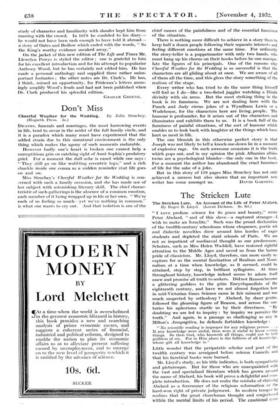Don't Miss
Cheerful Weather for the Wedding. By Julia Strachey. (Hogarth Press. 5s.) DEATHS, funerals and marriages, the most harrowing events in life, tend to occur in the midst of the full family circle, and it is a paradox which many must have experienced that the added strain due to this unnatural environment is the only thing which makes the agony of such moments endurable.
However badly one's heart is broken one cannot help a surreptitious grin on catching sight of Aunt Sophia's predatory grief. For a moment the dull ache is eased while one says : They still go on like wobbling eccentric tops," and a rich chuckle inside one comes as a sudden reminder that life goes on and on.
Miss Strachey's Cheetful Weather for the Wedding is con- cerned with such a family occasion, and she has made use of her subject with astonishing literary skill. The chief charac- teristic of such gatherings is the absence of a common emotion, each member of it being Wrapped up in his or her own. "We're each of us feeling so much—yet we've nothing in common," is what one wants to cry out. And that isolation is one of the chief causes of the painfulness and of the essential funniness of the situation.
There is nothing more difficult to achieve in a story than to keep half a dozen people following their separate interests and feeling different emotions at the same time. For ordinarily the story-teller is a puppetmaster with only two hands, 'who must hang up his chorus on their hooks before he can manipu- late the figures of his principals. One of the reasons why Cheerful Weather for the Wedding is so successful is that the characters are all gliding about at once. We are aware of all of them all the time, and this gives the-story something of the realism of the stage.
Every writer who has tried to do the same thing himself will feel as I do--like a two-fisted juggler watching a Hindu divinity with six arms. But the most striking thing in the book is its funniness. We are not dealing here with the Punch and Judy circus jokes of a Wyndham Lewis or a Wodehouse, for the characters here are living, people. The humour is profounder, for it arises out of the characters and illuminates and exhibits them to us. It is a book full of the funniness of painful situations, of the sort of humour which enables us to look back with laughter at the things which have hurt us most in life.
The one blemish in this otherwise perfect story is that Joseph was not likely to tell a knock-me-down lie in a moment of explosive rage. On such awesome occasions it is the truth which pops out, and in my opinion the pink Albanian albino twins are a psychological blunder—the only one in the book. For a moment the author has abandoned the cruel funniness of life for the sake of a joke.
But in this story of 119 pages Miss Strachey has not only achieved a success but also shown that an important new










































 Previous page
Previous page